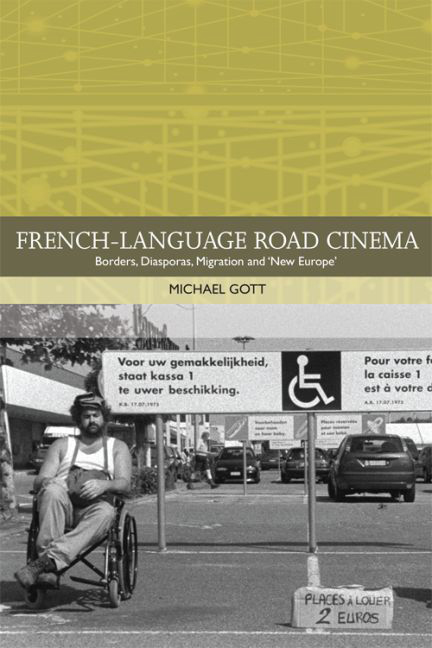Book contents
- Frontmatter
- Contents
- Acknowledgements
- List of Illustrations
- Traditions in World Cinema
- Introduction
- 1 Mapping the Hybrid European Road: French Connections, European Traditions and American Influence?
- 2 Remapping the European Road
- 3 Cowboys, Icebergs, Anarchists and Toreadors: The Paradoxes and Possibilities of the Francophone Belgian Road Cinema
- 4 Travelling Beyond the National: Mobile Citizenship and Flexible Identities in French-language Return Road Movies
- 5 The End of the Road? Dark Routes and Urban Passageways
- Conclusion
- Works Cited
- Index
Conclusion
Published online by Cambridge University Press: 12 September 2017
- Frontmatter
- Contents
- Acknowledgements
- List of Illustrations
- Traditions in World Cinema
- Introduction
- 1 Mapping the Hybrid European Road: French Connections, European Traditions and American Influence?
- 2 Remapping the European Road
- 3 Cowboys, Icebergs, Anarchists and Toreadors: The Paradoxes and Possibilities of the Francophone Belgian Road Cinema
- 4 Travelling Beyond the National: Mobile Citizenship and Flexible Identities in French-language Return Road Movies
- 5 The End of the Road? Dark Routes and Urban Passageways
- Conclusion
- Works Cited
- Index
Summary
In the first four chapters of this book I characterised road films as a cinematic gesture that in narrative and production terms transcends boundaries and avoids containment. If European road films generally retain some national specificity and have something profound to say about the place that the protagonists call home, they are by their very definition defined by the traversal of frontiers both figurative and literal. Contemporary French-language road cinema traces a web of interconnections and constant border-crossings that transcend national spaces and linguistic categories. Some of these demonstrate that language is more important than national identity in European cinematic production, as is the case with the French–Belgian space of cooperation and co-production that involves a constant back and forth of actors, directors, crews and films. Yet ‘French-language Europe’ is also an imperfect designation because in contemporary Europe films are apt to be multilingual. In the course of their voyages protagonists are often forced into contact with other languages: Swedish, Arabic, Spanish and Inuktitut to name just a few. While this tendency is not limited to road cinema, travelling films are particularly well suited to explore interactions between various spaces, places and cultures. The films I have covered employ travelling shots to film identities as fundamentally malleable and places as inherently unbounded, to return to Doreen Massey's (1994) assertion that I cited in the introduction. Road cinema therefore compels viewers and academics who study it to rethink categories of national or linguistic containment. ‘French-language Europe’ cannot be mapped exclusively along the lines of French-speaking nations, regions or zones. Rather, it is a fluid sphere of cinematic inspiration and production. It would also be inaccurate to label it as exclusively European. The films I consider are ‘based’ in Europe in various ways, with different places on the continent serving as starting points and funding sources. Yet many of them explore links between Europe and places on its fringes: Turkey, Armenia, Morocco and even the Arctic, demonstrating Randall Halle's contention that ‘Europe is not bound by clear borders’ (2014: 12). At its full potential, the road cinema of French-language Europe offers a compelling conception of a continent that while not entirely borderless is characterised by fluid boundaries both within and on its frontiers.
- Type
- Chapter
- Information
- French-language Road CinemaBorders, Diasporas, Migration and 'New Europe', pp. 178 - 181Publisher: Edinburgh University PressPrint publication year: 2016



